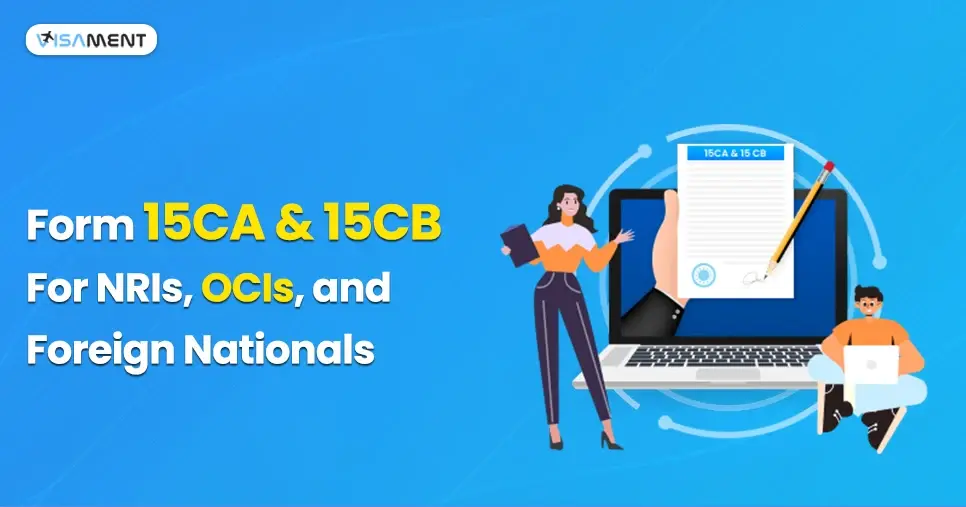- Understanding NRO Bank Accounts?
- Meaning of Repatriation for NRIs?
- Repatriation Rules for NRO Accounts by FEMA
- How to Reduce the Tax Burden on NRO Account Holders?
- Different Income Sources for NRIs that Can be Repatriated
- Repatriation Rules and Limits for NRO Bank Account
- Documents Required for NRO Repatriation
- Benefits of Non-Residents Ordinary Account Repatriation
- How Visament Helps You Navigate NRO Account Repatriation Rules
Are you an NRI and want to manage your income in India from overseas? Then, the process of managing income earned in India is no longer complex. It is possible because of the NRO account. Additionally, if you want to manage your earnings, it is crucial to know the NRO account repatriation rules to enjoy smooth fund transfers from an Indian bank to your overseas account.
Do you also want to manage your NRO account and hardly earn money from a foreign land? If yes, then this blog belongs to you. In this comprehensive guide, we will understand what an NRO account is and the rules for repatriating it. We will also discuss the Foreign Exchange Management Act (FEMA) guidelines and RBI regulations. Let’s begin with what an NRO is, and then we will look at the meaning of repatriation.
Understanding NRO Bank Accounts?
NRO stands for Non-Resident Ordinary bank account. It is one of the types of NRI bank accounts. An NRO Account for NRI is designed to help manage income earned in India, and there are two main types: the NRO savings account and the NRO fixed deposit. Both kinds of NRO accounts help NRIs manage their income from India and make transactions easy. But the question that arises here is whether the amount is fully repatriable or not. So, before learning the NRO account repatriation rules, it is essential to understand the meaning of repatriation.
Meaning of Repatriation for NRIs?
When we discuss the term repatriation for NRIs then it directly refers to transferring money from an Indian account to an overseas bank account and converting money from Indian currency to a foreign currency. If you are a Non-Resident Indian (NRI), then with the repatriation process, you can move your Indian money into an NRO, NRE, or FCNR bank account in your home country.
If you want to transfer your money from an Indian bank account to a foreign bank, then there are two types of accounts you can use: NRE and NRO. The major difference between NRE and NRO bank accounts is that an NRE Account offers fully repatriable funds, but an NRO account does not.
So, after knowing what NRO bank accounts are and what the term repatriation stands for. Next, we will check out the repatriation rules for NRO accounts by FEMA.
Repatriation Rules for NRO Accounts by FEMA
If we talk about the NRO account NRI Repatriation rules, then some restrictions and guidelines must be adhered to while repatriating funds from this account. It says that the only interest will be fully repatriated by NRO account holders under the consideration of FEMA regulations. Every financial year, a minimum of USD 1 million from the principal amount may be repatriated. On the other hand, it is also essential to remember that TDS (Tax Deducted at Source) applies to interest generated on NRO accounts. At the moment, interest received through an NRO account is subject to 30% taxation plus an extra CESS (Central Excise and Service Tax).
Do you want to transfer your money from your Indian bank account to your foreign account and look for ways to reduce taxes? If yes, then stay tuned with us. Next, we will learn the process of minimizing the tax burden for NRO account holders.
Expert NRO Application Services to manage your Global Financial, Legal, and Personal needs with ease and Efficiency through Visament.
Contact US
How to Reduce the Tax Burden on NRO Account Holders?
Luckily, NRIs can get around the tax burden in one way or another, Non-resident Indians are eligible to receive tax benefits through the Double Taxation Avoidance Agreements (DTAAs), which are bilateral agreements between India and a few other countries that grant them a reduced TDS rate. The NRI Income Tax Act of 1961, sections 90 and 90A, define DTAA. But to reduce your tax and enjoy the benefits, you need to submit some documents. Want to know what they are? If then next we will make a list of documents required to avail of reduced tax benefits.
Documents Required to Avail Reduced Tax Benefit
- Form 10F
- Tax Residency Certificate
- Self-declaration from NRI
- Self-attested copy of PAN
- Self-attested copy of Passport and VISA/PIO card
After checking out the documents required to reduce tax, the NRO account repatriation rules. It is time to move forward and know the different income sources for NRIs that can be repatriated.
Different Income Sources for NRIs that Can be Repatriated
If you are a non-resident Indian and have an NRO, NRE, and FCNR Account then you can repatriate various sources of income from India, including:
- Funds held in India before moving abroad
- Inherited funds in India
- Income from Indian assets (rent, dividends, etc.)
- Funds transferred to India as overseas remittances
Apart from all these things, there are some repatriation rules and limits for NRO bank accounts. Let’s check them out and become familiar with them.
Repatriation Rules and Limits for NRO Bank Account
According to FEMA guidelines that regulate the repatriation procedure for NRIs, there are some specific NRO account repatriation rules that must be adhered to. The following are important guidelines and restrictions for repatriation from an NRO account.
- After-tax deduction, the maximum amount that can be repatriated from an NRO account is USD 1 million every financial year.
- The maximum amount of money that can be repatriated from the sale of immovable and movable assets in India is USD 1 million every financial year.
- Before becoming eligible for repatriation, income sources such as inheritances, rent, or sale proceeds must first be taxed.
If you want to transfer your Indian earnings to your foreign account, then you need some documents for NRO repatriation. Let’s make a list of those documents and make the NRO bank account repatriation process easier.
Documents Required for NRO Repatriation

To repatriate from the NRO bank account, there are some specific documents required. So if you are raising a query for repatriation, then must fill and submit the below-mentioned documents.
- A request to your bank to initiate the repatriation process from a Non-Resident ordinary bank account.
- Fill Form A2 correctly and submit it to the bank.
- Fill out the Form 15CA. In this applicant needs to fill out self-declared payment details liable for taxes in India. which is used to self-declare payment details liable for taxes in India.
- Fill out an affirmation from a 15CB Chartered Accountant confirming tax clearance on repatriated funds
Additionally there are you will get on Non-Residents Ordinary Account Repatriation, which is mentioned below.
Benefits of Non-Residents Ordinary Account Repatriation
Are you looking to transfer your funds from an Indian bank account to a foreign account? If yes, then the NRO account repatriation rules also offer many benefits for NRIs. Let's check them out and initiate your fund transfer accordingly.
Flexibility in Managing Finances
When we talk about the benefits of NRO account repatriation then it is one of the nicest advantages among all. It enables non-resident Indians to manage their funds across several countries. With the use of an NRO account, repatriation NRIs can easily meet the financial commitments in their country of residence.
Diversification of Investments
When money is repatriated from the NRO account, NRIs will get various investment opportunities in their home country or other foreign markets.
Tax Optimisation
By returning money home, NRIs can minimize their tax obligations in both India and their home country, guaranteeing adherence to tax laws in both countries. Note that the interest gained is taxable in India under the country’s income tax rules, even though it can be repatriated.
Stop worrying about delays. Apply now and get NRO Account service.
Chat NowHow Visament Helps You Navigate NRO Account Repatriation Rules
In this blog above, we discussed the NRO account repatriation rules in which also cover various things. Including the Meaning of Repatriation for NRIs, Documents Required for NRO Repatriation, Tax Burden for NRO Account Holders, and many more. Still, if you are facing complications in understanding the repatriation rules for NRIs, then you can connect with Visament. They help you understand repatriation rules or open various types of NRI Bank Accounts such as NRO, NRE, and FCNR.
Apart from this, it is one of the greatest immigration service providers and helps with applications for their OCI, Aadhar card, PIO, NRI Certificate, Visa, and passport application form. So if you are looking for any immigration services, then you must try to hire them and make the process easier.
Frequently Asked Questions
Yes, US citizens can open a Non-Resident Ordinary account.
There are several disadvantages of NRO bank accounts including taxation, repatriation limits, limited investment opportunities, and more.
Yes, you can transfer money from a Non-Resident External (NRE) account to a Non-Resident Ordinary (NRO) account.
Yes, NRE account holders can repatriate money without any limit.
Form 15CA, Form 15CB, FEMA declaration, Bank Request Form, PAN card, VISA/Passport/OCI card. These are the required documents for repatriation from an NRO account.
Yes, you can deposit money in your NRO account from India.
When we talk about the time taken in the process of a repatriation request from an NRO account then it depends on the bank and the documents submitted.
The minimum balance for an NRO account depends on the different banks but is typically in the range of Rs 1,000 to Rs 10,000 per month.
_1742386512.webp)










